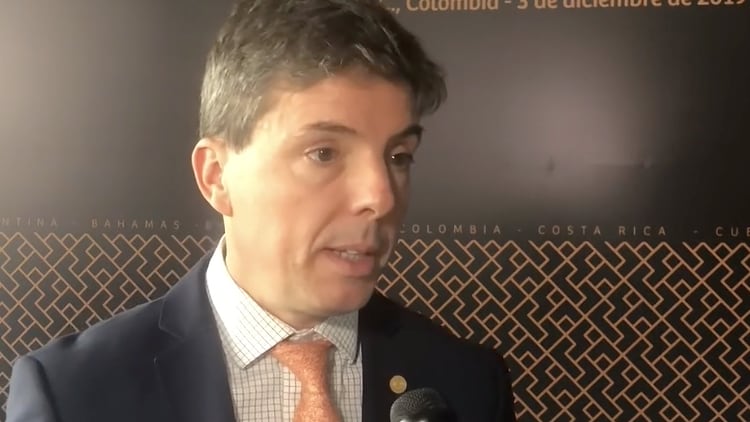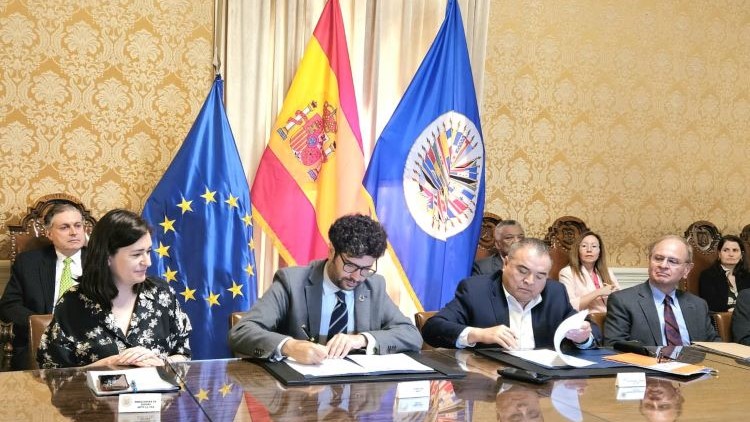The Diplomat
The Vice Minister of Foreign Affairs of Argentina, Leopoldo Sahores, who visited Spain this week, assures that relations between the two countries are above ideological differences or political approaches of the Argentine president, Javier Mili, and the head of the Spanish Executive, Pedro Sánchez.
In an interview with Europa Press, Sahores indicates, when asked if the arrival of Javier Milei to the Presidency of Argentina has marked a turning point in the public fluidity of political ties with Spain, he noted that this “historic” relationship It is advancing more discreetly and transcends “differences from an ideological point of view or political approaches”, since both parties continue to have an interest in “deepening” ties.
The vice minister met last Thursday with the State Secretary for Ibero-America, Susana Sumelzo, in a meeting that he described as “very productive” and in which, he said, issues were discussed at both a bilateral and multilateral level.
Sahores claims in the interview that the fabric of relations with Spain transcends “the merely institutional” and includes cultural, economic, social or sporting aspects. “A multidimensional relationship,” he adds.
For this reason, he affirms that any ideological discrepancy is “temporary” and there is room to “further consolidate the bilateral bond”, without it being a burden that Milei has clearly positioned himself on the side of Vox in Spain. In fact, the Argentine president is scheduled to attend a political event by Santiago Abascal’s party in Madrid in mid-May, without it being known for now that it will be an official visit.
He also does not believe that Milei’s ties with other ultra-conservative European leaders such as the Hungarian Viktor Orbán or the Italian Giorgia Meloni could complicate relations in the EU orbit, a bloc that Buenos Aires continues to see as “a fundamental partner for development.” economic”. “It is a partner with whom we have a community of values and traditions, because we are a product of European civilization, so it is the natural partner,” explains Sahores.
In this sense, he emphasizes that the current Government has put “all its energy” to conclude the “long-awaited and delayed” trade agreement between the EU and Mercosur, trusting that talks between the two parties can be resumed after the European elections in June. . The “big question”, in his opinion, is the future of this agreement, to which he prefers not to put a time horizon.
Milei wants to “go towards a definitive closure” and Argentina is “absolutely ready” to sign it, but Sahores points out that “the answer is on the European side.” On “the other side, we are attentive to the signals that come from Brussels”, he says.
Relations with Israel
Argentina’s priority in foreign policy is to “return to the international scene with a clear speech in defense of the democratic order, Western values and respect for Human Rights”, which, according to the vice chancellor, involves establishing clear positions in potential sources of tension nearby and in more distant ones such as the Middle East, immersed in a full escalation of tensions.
Milei has made few trips abroad, including to Israel, from where he promised to move the Argentine Embassy from Tel Aviv to Jerusalem. Regarding the efforts made by countries like Spain to accelerate the recognition of the Palestinian State, the ‘number two’ of Foreign Affairs has assumed that it is a historic aspiration that the international community “has to address” but it is not clear to him that the time is now.
“The current context perhaps imposes a pause. The region is going through a moment of great volatility,” he says, after the open conflict in the Gaza Strip after the Hamas attacks has been followed by a crossfire of attacks between Israel and Iran.
Questioned about the possibility that this rapprochement could lead to new security risks for Argentina, Sahores recalls that the South American country was already the scene of two attacks, in 1992 and 1994, for which Justice pointed directly to Hezbollah and Iran last week. in “a very important failure.” Argentina, he adds, “is not going to give up in its defense of the values in which it believes because of the possibility of retaliation.”
The Israeli Government has openly demanded that the Argentine adopt some type of measure against Tehran and, in particular, declare the Revolutionary Guard a terrorist group, although the diplomat alleges that “today”, the legal regime only contemplates such classification through an intervention by the UN Security Council or within the framework of a judicial investigation – therefore a unilateral step by the Government would not be possible.
Falklands
With respect to the historical claim on the Malvinas Islands, and once the statements that had allegedly been “misinterpreted” by Milei in the campaign – he went so far as to praise former British Prime Minister Margaret Thatcher – were clarified, Sahores highlights that the official position It involves “the defense of sovereignty”, something that he also aspires to raise before London.
Milei already held a face-to-face meeting with the British Foreign Minister, David Cameron, before he visited the disputed archipelago, and her Government aims to present its “intact” claims in future contacts. “For us, dialogue with the United Kingdom on this issue is key and, furthermore, it is the mandate that we have by resolution of the United Nations General Assembly,” he adds.
Buenos Aires wants, therefore, to “sit at the table” with London, on whose part it also perceives a willingness to continue talking. The vice chancellor points out, however, that the issue of the Malvinas, despite being “of course neuralgic” between the two countries, coexists with other issues because the United Kingdom continues to be “a key partner for economic development.”
Regarding relations with the United States, where Milei has also clearly positioned itself in favor of magnate Donald Trump ahead of the November elections, Sahores assures that relations today are already “excellent”, with the Democrat Joe Biden in the White House. “Regardless of the result” in November, he sees no reason for these ties to not only be maintained, but consolidated, regardless of possible “nuances” or variations in the bilateral agenda.







